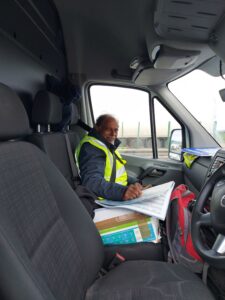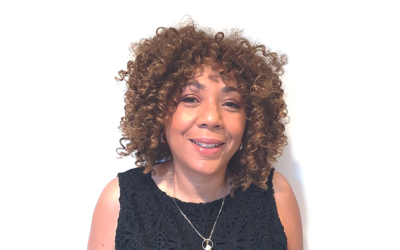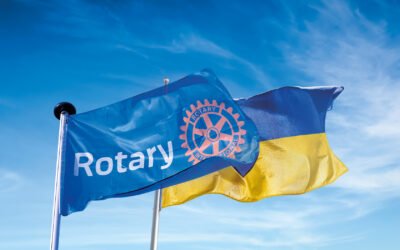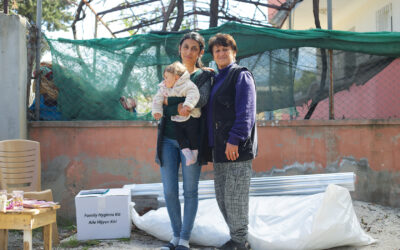My regular contact with medical colleagues in Ukraine causes me huge challenges.
When they tell me stories of mothers giving birth in cold bunkers, of vulnerable premature babies gasping for breath, of the millions of children internally displaced and traumatised by the war – all on top of the horrendous injuries suffered by soldiers and civilians, I feel numb.
A year on there is no sign of an end to this tragedy.
I worry about the thousands of innocent victims of this war. I also worry about my medical colleagues. How long can they cope with the pressure? What would be the consequences if they burn out? Who is caring for them? What is happening to the training of new doctors and other health professionals?
Listen to this article
I find it impossible to ‘prioritise’ the medical needs of the people of Ukraine. How do you choose between the lives of a soldier with blast injuries, a civilian with crushed limbs, a pregnant woman in labour in a bunker and a disabled youngster in an institution?
Who is involved in rehabilitation of those who have suffered life changing injuries?
There has never been a war such as this where a superpower has with impunity targeted a small country’s civilians and civilian infrastructures for so long. It is difficult to quantify the extent
of the suffering.
Rotarians have responded with speed – most of the medical aid we deliver is at the request of the Rotarian doctors in Ukraine – some of whom are members of the Ukrainian branch of the Fellowship of Healthcare Professionals.


“It has been an honour for me to coordinate, since the very beginning of the war, medical aid from Rotary in Great Britain & Ireland and beyond for Ukraine.” – Dr John Phillip
They have shown amazing resilience perhaps helped by the knowledge that the Fellowship, from the second week of the war has stood by them.
It has been an honour for me to coordinate, since the very beginning of the war, medical aid from Rotary in Great Britain & Ireland and beyond for Ukraine. I’m amazed at the generosity of Rotarians and others.
We have so far supplied £350,000 worth medical aid – including 20,000 tourniquets, orthopaedic instruments to treat ‘poly trauma’, Neopuff incubators to help new-born babies to 23 cities.
In December, I travelled 1,350 miles, from my home in Newbury across the channel, through France, Germany and Poland to the Ukrainian border town of Tomaszow Lubelski to hand over 120 boxes of vital medical equipment to colleagues from Ukraine.
The boxes were packed tight into two vans driven by two Scottish colleagues – my role was mainly navigating.
The reason I felt compelled to make this journey was because the medical equipment was purchased by donations from Rotarians and well-wishers – it was highly specialised equipment for 37 maternity hospitals. I could not simply rely on someone else to take responsibility for this.
So long as the war continues pregnant women will face increasing risk – so will new-born babies. We would like to see a coordinated effort to support pregnant women and new-born babies.
With the increased risk of premature and low birthweight babies born in less-than-ideal conditions, there is an increased risk of them suffering various medical problems including oxygen starvation. This could result in mental or physical disability.
Ukraine has one of the lowest fertility rates in the world. Its population has declined since the 1990s. With a generation of young people growing up with physical and mental trauma, the long-term impact to the country is unthinkable. The children are the future, protecting the children must be one of our top priorities.
The real time stories we hear from them are the worst example of man’s cruelty to man.”
Our current focus is on supplying Kangaroo Mother Care (KMC) wraps to a number of maternity hospitals. KMC includes keeping small (pre-term) babies skin-to-skin with their mother (or another family member). Studies of KMC report increased survival, decreased infection, improved nutrition and growth and possible improved development.
The wraps are being manufactured in Moldova and distributed internally by ‘Early Birds’, a parent association in Ukraine. They have identified 30 hospitals where the wraps are most needed. It is estimated that an average of 300 to 600 infants per month will benefit.
We are also supplying small, knitted hats to complement KMC. Such hats for new-born babies may be life-saving.
Their heads are relatively larger than bodies compared to older children and adults and a large source of potentially risky heat loss.
I’ve been overwhelmed by the response from Rotarians and friends who have been knitting baby hats and sending them to me. They will soon be worn by vulnerable new-borns in Ukraine!
The Fellowship has launched a project reaching out to Children in Need in Ukraine to assess the impact of the war on their mental health and explore how we may help them.
Many children have been killed or injured, many have lost parents and siblings, their homes, schools and playgrounds. We have been told that some have been kidnapped and trafficked. No child should ever have to bear that kind of suffering. They need mental and physical support urgently.
We’re grateful to Rotarians in Ukraine who keep us informed of the changing situations in their country.
The real time stories we hear from them are the worst example of man’s cruelty to man.
These stories are evidence of the collapse of the international order as we knew it before February 24th, 2022.
The stories need to be told and retold, as we seek to do in whatever way we can, to stir the hearts and minds of people all over the world.


























































